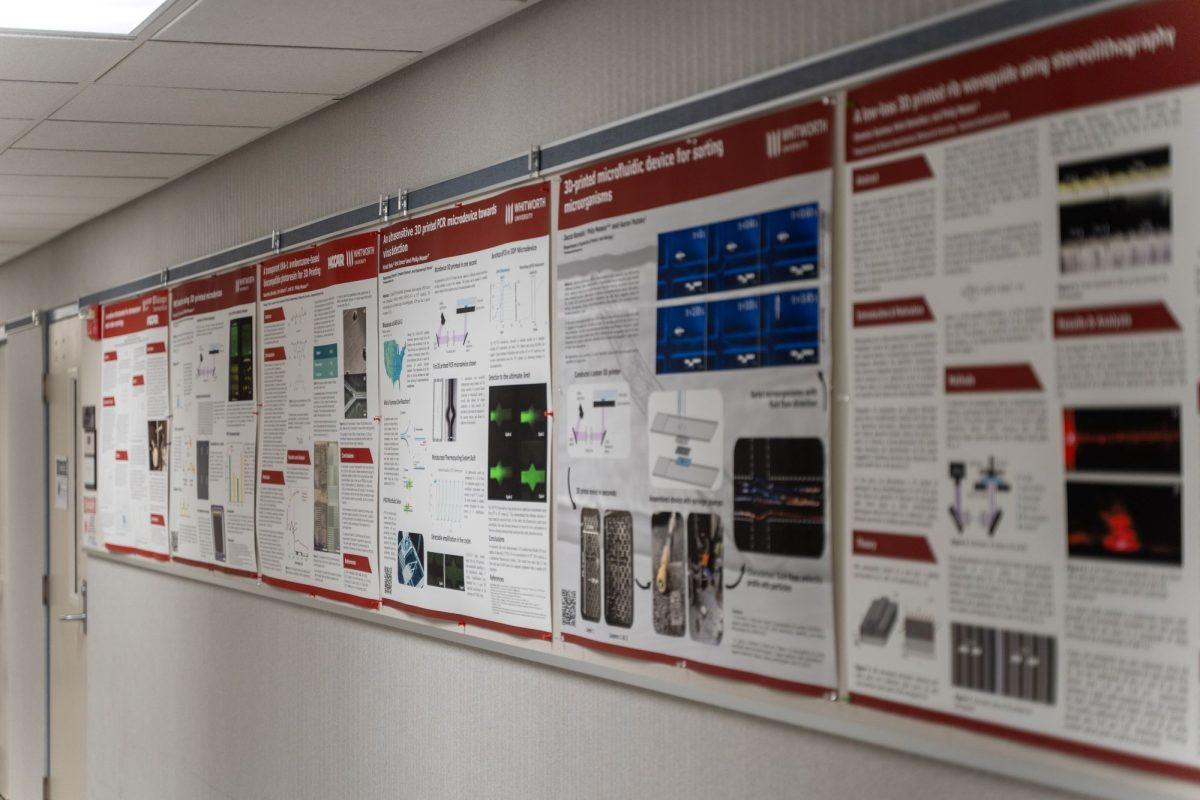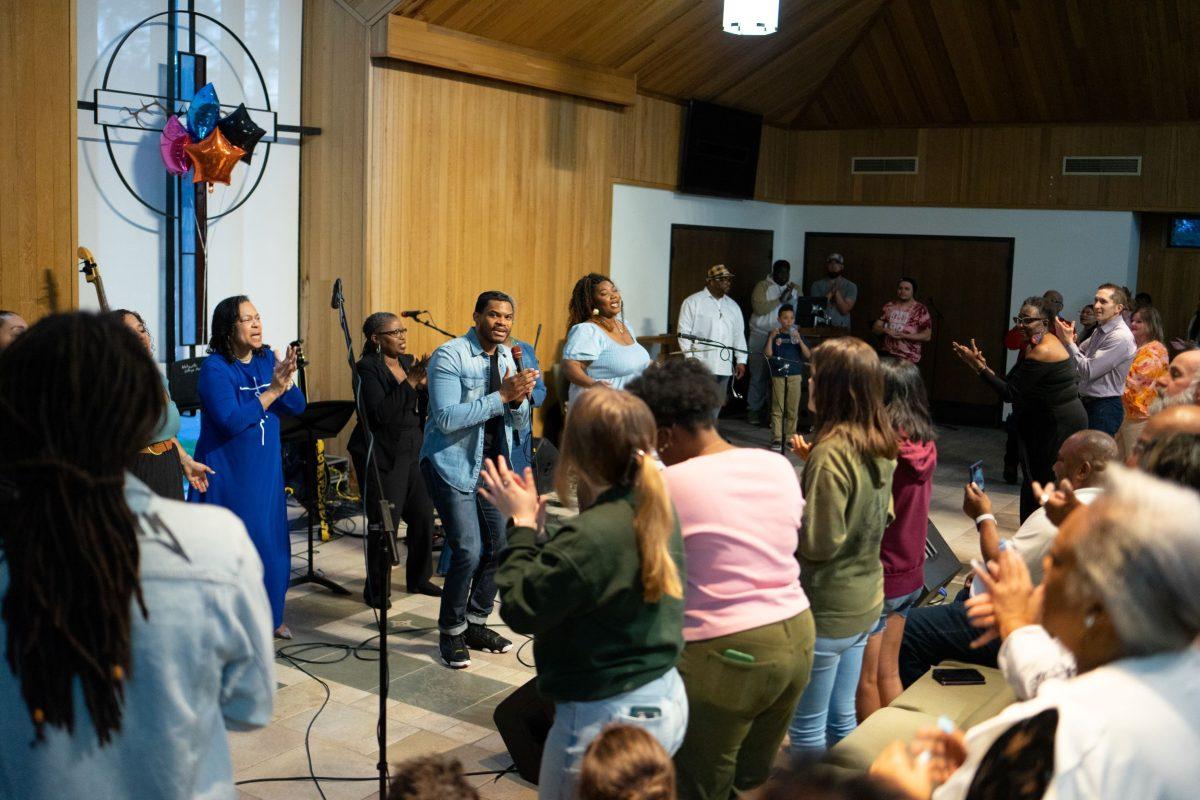Whitworth launched its chapter of the violence prevention effort Green Dot, a non-profit organization founded and run by Dr. Dorothy Edwards Wednesday Feb. 13. Green Dot is a bystander intervention model that provides employable solutions for bystanders to prevent violence.
Edwards, who has a master’s degree in counseling psychology from Texas Woman’s University, has been working in prevention her whole career. She founded Green Dot about three years ago. The program, initially implemented on college campuses, is now also seen in high schools, middle schools and k-3 schools.
In the Green Dot model, acts of power-based personal violence, including harassment, sexual assault, stalking, bullying or physical or verbal abuse are considered red dots, while a green dot represents preventative action taken. The goal is to bring down rates of violence by educating and empowering people to create green dots in their community.
“It’s a way to engage people to look out for each other,” said counselor Pam Oswalt, who was instrumental in implementing Green Dot at Whitworth.
Events kicked off Wednesday morning with the Green Dot launch party. In addition to two short presentations by Edwards, six stations of information and activities were set up for students to engage in.
Student art and music was also featured at the event, such as posters, graphics and a logo created by students of Brytton Bjorngaard’s graphic arts class and a Green Dot jingle written by junior Kyle Moreen.
Edwards said the amount of participation from all across the Whitworth community made this launch one of the most extraordinary she has seen.
“Everyone expects counseling services to care, everyone expects police to care, but when your facilities director cares, and when your payroll staff care, when your IT people care, when students in a computer class care, when students in a graphic design class care, and when student musicians care, suddenly we’re talking about real possibility to see culture change,” Edwards said.
Edwards gave a lecture Wednesday evening to Whitworth students, faculty and staff, as well as other members of the Spokane community. During her talk, she discussed the importance of power-based personal violence prevention.
“The cost of not succeeding is so unspeakably high that we don’t have a choice,” she said.
Her emphasis was on the power of individuals to change culture.
“Don’t tell me culture can’t change in substantive, profound, lasting ways. Of course it can,” Edwards said. “Culture change happens every time a bunch of little moments add up to something bigger.”
Those little moments are the “green dots” her organization is built on. In her lecture, Edwards outlined two types of green dots: proactive and reactive.
Proactive green dots include raising awareness, or communicating that violence is not tolerated. Reactive green dots include responding to red dot or potential red dot situations when they are happening.
The bystander intervention model of Green Dot teaches three different ways to be reactive — “The Three Ds:” direct, delegate or distract. Edwards said these three strategies are designed for everybody to have a way to intervene, whether they’re more comfortable confronting the situation directly, getting someone else to do it, or creating a distraction.
She said that though everyone has challenges, there are always options for them.
“You’re not a bad person because you have obstacles, but you need to know it doesn’t render you powerless,” Edwards said.
Edwards said that one of the necessary steps was for people to understand that their choices and actions are important.
“Too many of us have sacrificed the power of our choices. For whatever reason, we’ve let go of our moments…I challenge you: believe in what you can do. Grab onto that moment — it’s the thing that’s going to save us,” Edwards said.
Oswalt, who attended Edwards’ lecture, said she was inspired by the attention to individual action.
“We all left empowered to make a difference,” Oswalt said.
Preparation for this launch began last January, when a group of colleges and organizations in the region, including Whitworth, Gonzaga University, Eastern Washington University, Lutheran Community Services, Washington State University among others, pooled their funds to bring the Green Dot training to Spokane. This four day training equipped participants to conduct their own bystander intervention training sessions.
Ten members of Whitworth faculty and staff were chosen by Oswalt to participate, and have since conducted bystander intervention training for forty faculty and students, with an upcoming session scheduled to train another forty.
Additionally, Oswalt led discussions with various focus groups to determine what “red dot” challenges our school faces as well as what hinders people from taking action against them. Oswalt said most of the groups agreed that hurtful words were a prominent issue on the Whitworth campus.
Moreen, who composed the Green Dot jingle, said he recognizes certain challenges with efforts like this. He said that even though the launch was successful, it will take sustained effort and energy to keep the movement going.
“The inherent issue with programs like these is that people have to take them seriously in order for them to work,” Moreen said.
He said that, in the case that students do continue to participate, the goals of Green Dot are attainable at Whitworth.
“I think if people get excited about participating, I feel the conclusion’s obvious: a lot of these scenarios [of violence] will go away,” Moreen said.
Oswalt said there will be other Green Dot related events, such as discussing bystander intervention at Prime Times, having a Green Dot booth at the senior fair, and hosting bystander intervention trainings twice a year. She said she believes the launch is merely the beginning of the conversation.
“The launch was to bring a moment of awareness; a way of initiating conversation campus-wide,” Oswalt said.
Oswalt said she hopes Green Dot will become part of the common language of Whitworth, and is optimistic about the changes we can make.
“I’m absolutely hopeful. I’m anticipating that we can make a change. It really reflects the Whitworth culture,” Oswalt said.
Edwards also said she is optimistic for Whitworth’s potential to achieve Green Dot goals.
“If what happened over the last day is an indicator of the kind of commitment of this community, I’m willing to bet that sooner than we think you’re going to start seeing the numbers come down,” Edwards said.
Contact Katie Knoll at [email protected]





